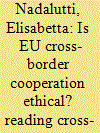| Srl | Item |
| 1 |
ID:
140884


|
|
|
|
|
| Summary/Abstract |
This article applies Simone Weil’s philosophical concept of ‘uprootedness’ and the ‘14 needs of the soul’, set out in her 1943 book ‘The Need for Roots’, to the empirical case study of the border ‘Italy-Slovenia’ considered within Programme 2007–2013. A multi-dimensional qualitative approach that relies on an extensive literature, consultation of primary sources and semi-structured interviews carried out between October 2013 and February 2014 has been adopted.The article questions why does cross-border-cooperation often fail to develop an ‘integrated’ border territory and a cohesive ‘moral’ community? Conversely, why does social fragmentation emerge from cross-border-cooperation? It is argued that while the EU (Commission) has focused on initiatives and projects in order to achieve regional, economic border integration, it has instead failed to develop an ‘ethical framework’ for promoting a ‘rooted’ integrated borderland and a cohesive moral community.
|
|
|
|
|
|
|
|
|
|
|
|
|
|
|
|
| 2 |
ID:
141625


|
|
|
|
|
| Summary/Abstract |
This article aims to generate new thinking through application of the concept of trans-border governance to Southeast-Asia within the framework of new regionalism theory in order to fill some gaps in trans-border governance theory. In doing so, it will first elucidate in more detail what actors are involved in trans-border cooperation activities, how their responsibilities, jurisdictions and relative powers can be or have been altered by the interaction and whether trans-border cooperation can be used as a tool for further ‘integration’ or conversely whether it can enhance, as a counter effect, ‘disintegration’. In examining the (economic and political) power relations developed within and between different levels of governments and relevant economic and political stakeholders in ‘growth triangles’, the author aims to clarify the impact of these elements on trans-border governance.
|
|
|
|
|
|
|
|
|
|
|
|
|
|
|
|
| 3 |
ID:
134962


|
|
|
|
|
| Summary/Abstract |
This article aims to offer a theoretical background on the meaning of “governance” and “cross-border cooperation” in the European Union (EU) and the Association of Southeast Asian Nations (ASEAN). Looking at the European Union cross-border regions and Association of South East Asian Nations growth triangles, this article seeks to understand firstly what changes (if any) cross-border cooperation has occasioned in the state; secondly, whether a kind of “border governance”, that is multi-level, is emerging in cross-border areas. It will be argued that cross-border cooperation activities may contribute to transform the operation of power across the various levels of governance on a local/national/supranational level and a “new mode” of governance that is “multi-layered” can emerge from this scenario. Accordingly, the state can be both strengthened and weakened by cross-border cooperation activities. Moreover, the change that is occurring within the concept of governance cannot be fully grasped without considering the emergence and importance of networks, the impact that cross-border movements and relationships have on the livelihoods and everyday trades of the local border communities
|
|
|
|
|
|
|
|
|
|
|
|
|
|
|
|